
-
 Mbappe's adaptation period over: Real Madrid's Ancelotti
Mbappe's adaptation period over: Real Madrid's Ancelotti
-
France's most powerful nuclear reactor finally comes on stream

-
 Ski great Vonn finishes 14th on World Cup return
Ski great Vonn finishes 14th on World Cup return
-
Scholz visits site of deadly Christmas market attack

-
 Heavyweight foes Usyk, Fury set for titanic rematch
Heavyweight foes Usyk, Fury set for titanic rematch
-
Drone attack hits Russian city 1,000km from Ukraine frontier

-
 Former England winger Eastham dies aged 88
Former England winger Eastham dies aged 88
-
Pakistan Taliban claim raid killing 16 soldiers

-
 Pakistan military courts convict 25 of pro-Khan unrest
Pakistan military courts convict 25 of pro-Khan unrest
-
US Congress passes bill to avert shutdown

-
 Sierra Leone student tackles toxic air pollution
Sierra Leone student tackles toxic air pollution
-
German leader to visit site of deadly Christmas market attack

-
 16 injured after Israel hit by Yemen-launched 'projectile'
16 injured after Israel hit by Yemen-launched 'projectile'
-
Google counters bid by US to force sale of Chrome

-
 Russia says Kursk strike kills 5 after Moscow claims deadly Kyiv attack
Russia says Kursk strike kills 5 after Moscow claims deadly Kyiv attack
-
Cavaliers cruise past Bucks, Embiid shines in Sixers win

-
 US President Biden authorizes $571 million in military aid to Taiwan
US President Biden authorizes $571 million in military aid to Taiwan
-
Arahmaiani: the Indonesian artist with a thousand lives
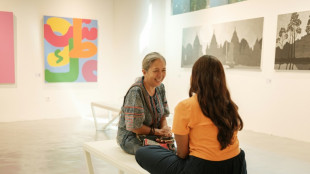
-
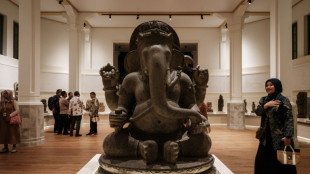 Indonesians embrace return of plundered treasure from the Dutch
Indonesians embrace return of plundered treasure from the Dutch
-
Qualcomm scores key win in licensing dispute with Arm

-
 Scientists observe 'negative time' in quantum experiments
Scientists observe 'negative time' in quantum experiments
-
US approves first drug treatment for sleep apnea

-
 US drops bounty for Syria's new leader after Damascus meeting
US drops bounty for Syria's new leader after Damascus meeting
-
Saudi man arrested after deadly car attack on German Christmas market

-
 'Torn from my side': horror of German Christmas market attack
'Torn from my side': horror of German Christmas market attack
-
Bayern Munich rout Leipzig on sombre night in Germany

-
 Tiger in family golf event but has 'long way' before PGA return
Tiger in family golf event but has 'long way' before PGA return
-
Pogba wants to 'turn page' after brother sentenced in extortion case

-
 Court rules against El Salvador in controversial abortion case
Court rules against El Salvador in controversial abortion case
-
French court hands down heavy sentences in teacher beheading trial

-
 Israel army says troops shot Syrian protester in leg
Israel army says troops shot Syrian protester in leg
-
Tien sets-up all-American NextGen semi-final duel

-
 Bulked-up Fury promises 'war' in Usyk rematch
Bulked-up Fury promises 'war' in Usyk rematch
-
Major reshuffle as Trudeau faces party pressure, Trump taunts

-
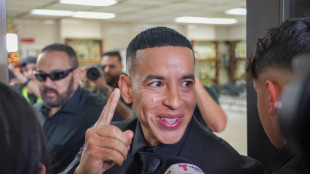 Reggaeton star Daddy Yankee in court, says wife embezzled $100 mn
Reggaeton star Daddy Yankee in court, says wife embezzled $100 mn
-
Injured Eze out of Palace's clash with Arsenal

-
 Norway's Deila named coach of MLS Atlanta United
Norway's Deila named coach of MLS Atlanta United
-
Inter-American Court rules Colombia drilling violated native rights

-
 Amazon expects no disruptions as US strike goes into 2nd day
Amazon expects no disruptions as US strike goes into 2nd day
-
Man Utd 'more in control' under Amorim says Iraola

-
 Emery insists Guardiola 'still the best' despite Man City slump
Emery insists Guardiola 'still the best' despite Man City slump
-
US confirms billions in chips funds to Samsung, Texas Instruments

-
 English Rugby Football Union chairman quits amid pay row
English Rugby Football Union chairman quits amid pay row
-
Major reshuffle as Trudeau faces party pressure, Trump attacks

-
 Gatland remains as Wales boss but must 'change fortunes on the pitch'
Gatland remains as Wales boss but must 'change fortunes on the pitch'
-
Argentina's dollar craze cools under greenback-loving Milei

-
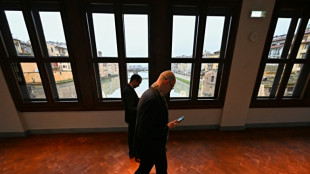 Medici secret passageway in Florence reopens after refit
Medici secret passageway in Florence reopens after refit
-
Anger after Musk backs German far right
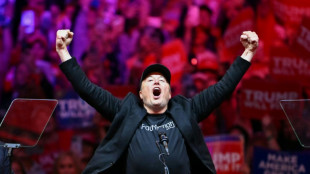
-
 Arteta says 'best is yet to come' as he marks five years at Arsenal
Arteta says 'best is yet to come' as he marks five years at Arsenal
-
Pereira happy to achieve Premier League 'target' with Wolves


Geoffrey Hinton, soft-spoken godfather of AI
For a brief moment in spring last year, the bird-like features of bespectacled British-born researcher Geoffrey Hinton were poking out from TV screens across the world.
Hinton, a big name in the world of artificial intelligence but largely unknown outside it, was warning that the technology he had helped to create -- for which he was awarded the 2024 Nobel Prize -- could pose an existential threat to humanity.
"What do you think the chances are of AI wiping out humanity," a reporter from the US network CBS News asked in March last year.
"It's not inconceivable," replied Hinton, making a very British understatement.
A few weeks later, he had walked away from his job at Google and was giving interviews to media across the world, quickly becoming the poster-child for AI doomsayers.
- Difficult family life -
Hinton, a 76-year-old soft-spoken career academic, was born in London, raised in Bristol and went to the universities of Cambridge and Edinburgh.
He has described his early life as a high pressure existence, trying to live up to the expectations of a family with an illustrious history, littered with storied scientists.
Even his father was a member of the Royal Society.
He told Toronto Life magazine he had struggled with depression his whole life and work was a way of releasing the pressure.
But Hinton has rarely been able to fully escape into his work.
His first wife died from cancer shortly after the couple had adopted their two children in the early 1990s, thrusting him into the role of single parent.
"I cannot imagine how a woman with children can have an academic career," he told Toronto Life.
"I'm used to being able to spend my time just thinking about ideas... But with small kids, it's just not on."
- 'Utterly correct' -
After spending time in universities in the United States in the late 1970s and 1980s, Hinton relocated to Toronto in 1987, his base ever since.
Hinton, a self-professed socialist who recalls his family stuffing envelopes for the British Labour Party, had been unwilling to accept funding from the US military, which was the biggest funder for his kind of research.
The Canadian government agreed to back his research, which attempted to replicate the functioning of the human brain by engineering artificial "neural networks".
Although he spent years on the academic fringes, a research community grew up around him in the Canadian city, and eventually his vision came to dominate the field.
And then Google came knocking.
He took a job with the Silicon Valley juggernaut in 2013 and suddenly became one of the central figures in the emerging industry.
As competition ramped up, many of his students took posts in companies including Meta, Apple and Uber.
Ilya Sutskever, who founded OpenAI, worked in Hinton's team for years and has described the time as "critical" for his career.
He told Toronto University's website in 2017 they pursued "ideas that were both highly unappreciated by most scientists, yet turned out to be utterly correct".
But Sutskever and Hinton have emerged as prominent worriers about the technology -- Sutskever was pushed out of OpenAI for raising concerns about their products a year after Hinton exited Google.
And true to form, even during his acceptance speech for the Nobel Prize -- he received the news in a "cheap hotel in California" -- Hinton was still talking of regret rather than success.
"In the same circumstances, I would do the same again," he said.
"But I am worried that the overall consequence of this might be systems more intelligent than us that eventually take control."
F.Santana--PC
